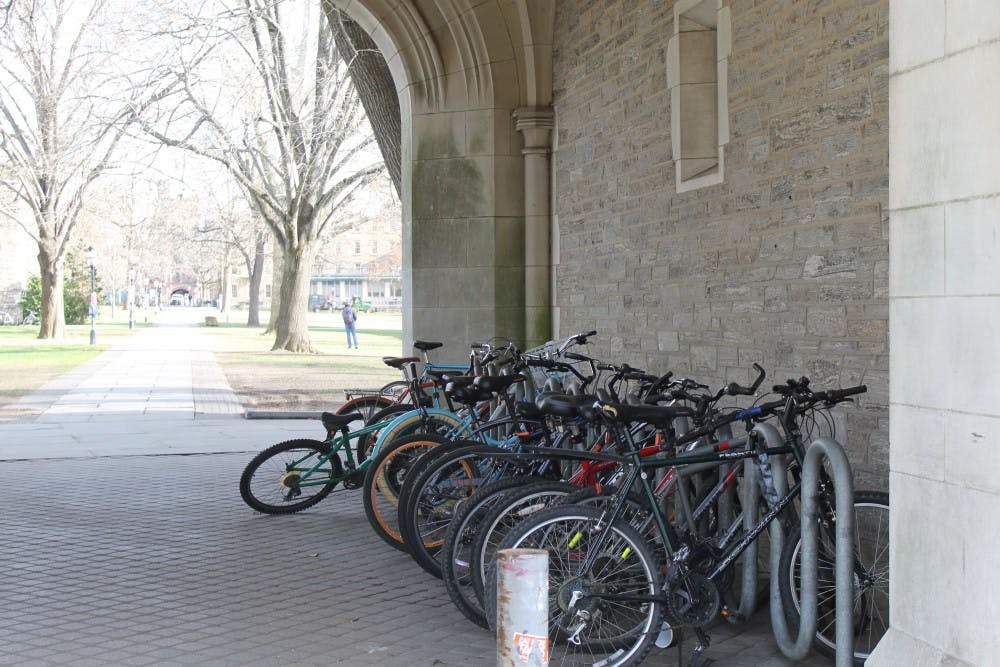The Department of Public Safety has placed bait bikes around campus to catch bike thieves in the act and deter bike theft on campus.
These bait bikes are locked bicycles equipped with GPS tracking devices. If a bike is taken, Public Safety can track its location and the person in possession of the bike.
As part of the Bait Bikes Program, Public Safety will provide registered bike riders with stickers that say “This Could Be a Bait Bike: Think Before You Steal” so potential thieves will not know which bikes are being tracked.
In order to obtain a bait bike sticker, students, faculty, and staff must first register their bikes with Transportation and Parking Services. Registration is free.
Executive Director of Public Safety Paul Ominsky told the Office of Communications that bike theft is one of the most common crimes on college campuses, and that bikes are the most commonly stolen item at the University.
Ben Parker ’20, a bike owner himself, believed that the program could be successful because it forces potential bike thieves to think twice before stealing.
“People are less likely to commit a crime when the likelihood of being caught gets higher,” Parker said. “A bike potentially being tagged would do that for sure.”
However, Parker had some hesitations about the actual logistics of the program, saying that the program felt like an “icky … entrapment.”

Kate O’Brien ’19 had her bike stolen last December. She had gone to Murray-Dodge Hall for cookies for about an hour and left her bike outside with the lock on but not secured. When she left Murray-Dodge, her bike was no longer there.
“I had my bike since freshman year, and it was my baby,” O’Brien said. “I don’t walk anywhere. I was very upset.”
O’Brien noted that, ironically, she had been writing a paper for her journalism class on bike theft when her bike was stolen.
O’Brien used her Snapchat story, Instagram, and the Butler Buzz listserv to spread the word to her peers about her missing bike.

“I had this whole movement going on,” O’Brien said.
She found her bike a few days later outside of the second floor entrance to the Frist Campus Center and has securely locked her bike ever since. She expressed optimism towards Public Safety’s bait bike system, though she lamented its necessity.
“I think it’s worth a shot,” O’Brien said. “It’s kind of sad that we have to do that. So many of my friends have had their bikes stolen, and many haven’t found them.”
More recently, about a week ago, Sophie Evans ’21 had her bike stolen outside East Pyne Hall. She has yet to find it or have it returned, although she noted that she did not have her bike registered with Public Safety.
“I had hoped someone was taking it to get somewhere in the rain, and I would get it back after, but it was to avail,” Evans said.
Should the bait bike system be effective, Evans said she would be interested to see where the stolen bikes end up.
“I’d be interested to see if the bikes stay on campus, by the boathouse, or if they [appear] in bike shops across New Jersey,” Evans said.
Corporal Martin Krzywicki and Sergeant Sean Ryder are leading the Bait Bike Program. Krzywicki was unavailable for comment at the time of this publication, while Ryder deferred to the Office of Communications and Deputy University Spokesperson Michael Hotchkiss.
Members of Public Safety will be answering further questions from students on the Bait Bike Program at the “Coffee with a Cop” event from 8 to 11 a.m. Monday, Dec. 10, at Frist Campus Center.








